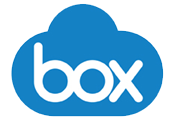Box is a data management and collaboration service that provides file-sharing and document creation/review/editing with unlimited cloud storage which helps you securely store, share, and manage your data. Working with fellow staff, faculty, students or even external partners has never been simpler. Box allows you to securely share files and collaborate with anyone on any internet connected device: PC, Mac, or mobile. Easily create, edit and review Microsoft Office documents with others in real-time or on-the-go.
Box makes it simple to securely share files and folders without requiring IT intervention. Some features of Box include:
- Box Drive: An application that makes using Box as easy as using My Documents or your Desktop for saving your work.
- Manage File/Folder Access: Set permissions for document access and share links to the data with students, staff, faculty, and external recipients.
- Share Externally: Invite external parties to collaborate and contribute, no matter where they are or what device they use.
Click below to learn how to:
What kinds of data can be stored in Box.com?
| Data Type | OK | Not OK |
|---|---|---|
| Budget Information | ✔ | |
| Contracts | ✔ | |
| Course evaluations | ✔ | |
| Data classified as Public | ✔ | |
| Data classified as Restricted | ✔ | |
| Employee and student IDs/GIDs (even when combined with names) | ✔ | |
| Planning documents | ✔ | |
| Staff search committee notes | ✔ | |
| Student grades and records | ✔ | |
| Bank account numbers | X | |
| Credit card numbers | X | |
| Data classified as Confidential | X | |
| Drivers License numbers | X | |
| Passport Visa numbers | X | |
| Payroll ACH numbers | X | |
| Research data subject to export controls | X | |
| Social Security numbers | X | |
| International Traffic in Arms Regulations (ITAR) and Export Administration Regulations (EAR) governed data | X |
-
Confidential Data: All data which, if released in an uncontrolled fashion, could have substantial fiscal or legal impacts on the University. Examples include social security numbers, financial account numbers, driver’s license numbers, health insurance policy ID numbers, protected health information (PHI), passport visa numbers, and export controlled information under U.S. laws.
-
Restricted Data: All data for which release or modification without authorization could have an adverse affect on the operations, assets, or reputation of the University. Examples include employee and student ID numbers (GIDs), course evaluations, financial transactions that do not include confidential data, contracts, planning documents, and student education records as defined by the Family Educational Rights and Privacy Act (FERPA). All files are assumed to be ‘restricted’ unless otherwise classified as ‘public’ or ‘confidential’.
-
Public Data: All data that is not restricted by one of the above classifications and may be released to the general public in a controlled manner, such as information designated as "Directory Information" under University policy pertaining to FERPA. Other examples include course schedules, public web pages, campus maps, policy documents, faculty publications, job opening announcements, and press releases.

